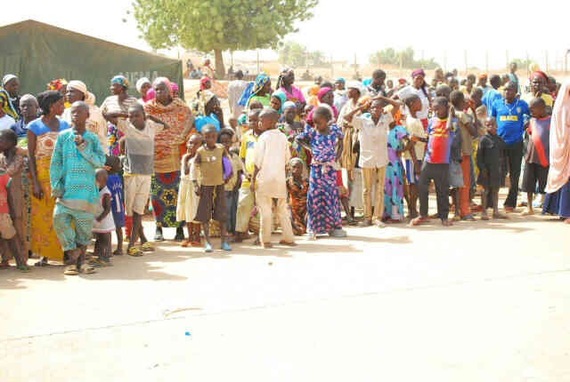The International Day of Innocent Children Victims of Aggression, marked on June 4, is particularly poignant for Nigeria this year. Placed under pressure from violence in the north-east as a result of the Boko Haram insurgency, on-going inter-communal clashes and natural hazard-induced disasters, there are currently over 1.5 million internally displaced Nigerians, living in overrun and over-capacity internally displaced persons (IDP) camps. Many of the IDPs are children, including a large number of newborns.
In Borno State alone, over 100 babies are born daily in IDP camps with an average of five to six deliveries in each of the state's 21 camps. As the Newborn Champion for Save the Children Nigeria, I am deeply concerned about the burgeoning newborn health crisis in these camps, with a large number of births occurring in camps that currently lack safe and clean birthing facilities. To help facilitate clean deliveries in Adamawa State, Wellbeing Foundation Africa (WBFA) donated our Mama Kits, that contain all essential health commodities that can transform any location - even an IDP camp - into a safe and clean birthing area. Scaling up access to clean delivery kits is crucial if we are to meet the challenges of this potential newborn health crisis.
Whilst there are plans from state government officials to set up a medically equipped delivery room in each of the camps in Borno State, WBFA and I believe that an international and national response to the crisis must also include ensuring these innocent newborns can access skilled emergency care from midwives and doctors in the fragile first 24 hours of life. The first 24 hours after birth are the most critical, with more than one million babies dying each year on their first and only day of life. Without immediate skilled medical attention provided by a midwife or doctor, Nigeria will struggle to save the lives of our youngest citizens in the north.
Moreover, I am struck by the moral crisis facing us as a nation. An infant born in an IDP camp enters the world in an environment of insecurity and uncertainty, without a safe place to call home. An infant born in an IDP camp will grow into a child without access to a safe place to play. An infant born in an IDP camp will grow into a child without access to a safe school. It is a moral imperative that we work with local and international partners, including the International Committee of the Red Cross (ICRC) - whose President, Peter Maurer, visited Nigerian refugees in the Lake Chad region last week - to ensure that our IDP camps are as safe as possible for our newborns and children.
The ramifications of this go far beyond the immediate newborn health crisis, with children growing up in an IDP camp at risk of long-term post-traumatic stress disorder and serious mental health concerns. The restoration of peace in the northern states and resettlement of Nigeria's IDPs will not be the end of our journey. We must now put in place a comprehensive plan that will allow us to provide adequate psychological care as part of the rehabilitation of our young internally displaced children.
The International Day of Innocent Children Victims of Aggression was set up by the United Nations to acknowledge the pain suffered by children throughout the world who are the victims of physical, mental and emotional abuse. Children living in Nigeria's IDP camps are victims of all three. Our newborns face physical trauma during birth in crowded and unclean conditions, and our children face emotional trauma growing up in this environment, leading to increased risk of mental health problems.
This day is part of the UN's wider commitment to protect the rights of children under the Convention on the Rights of the Child (CRC). The CRC is the recognition of the rights for children to develop their full potential, free from hunger and want, neglect and abuse. On this day, we must join hands to not just acknowledge their pain but work to alleviate it, by making birth safer in the camps, by making our camps safer as a whole, and by ensuring a comprehensive rehabilitation plan is developed in consultation between the government and civil society.
